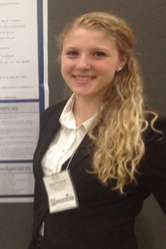Major: Mathematics
“The Dirichlet problem on an Ellipsoid with Polynomial Boundary Values”

The Dirichlet problem is a fundamental problem that occurs all over science. It can be used to determine the gravitational force between celestial bodies, to model the distribution of heat and in the medical sciences to map a full image of the brain when only a partial image is provided.
If Ω is a region in the plane, a function F : Ω → R is called harmonic if the value of F at any point x in Ω equals the average of F over any small ball. The Dirichlet problem for the region Ω asks us to find, for any given function P : ∂Ω → R, a harmonic function u on Ω that agrees with P on ∂Ω.
In this study, we aim to compute an explicit solution to the Dirichlet problem as well as make observations about the solution as the region changes. We will consider the fundamental case when Ω is a 2 dimensional ellipse with a given degree, d, polynomial boundary value. It has previously been shown that in this case, the solution, u, will also be a polynomial. We have computed this polynomial explicitly for input of degree, d = 2; 3. We found that the solutions coefficients depend more on the boundary value polynomial instead of the ellipse. We will continue to explore the quantitative properties of the solution u as the shape of the ellipsoid changes.
What research experiences have you had?
I participated in the Leadership Alliance program at the University of Chicago this past summer. I worked with Dr. Benson Farb in the mathematics and statistics department on a project called “The Dirichlet Problem on an Ellipse with Polynomial Boundary Values.”
How did you find the research opportunity?
The Meyerhoff Scholars Program suggested that I apply for summer research opportunities through the Leadership Alliance. I chose to apply to the University of Chicago through Leadership Alliance because the University of Chicago has an outstanding mathematics graduate program.
Who did you work with on this project?
I worked with my mentor, Dr. Benson Farb, and graduate student Wouter van Limbeek
Do you get course credit for this work? Paid? How much time do you put into it?
It was an eight-week summer program where I got paid $3,400. I worked five days a week, from 9am-5pm.
What academic background did you have before you started?
Before I went to Chicago, I had completed my freshman year. My math background included the calculus series, Linear Algebra and Ordinary Differential Equations.
How did you learn what you needed to know to be successful in this lab?
To complete my project, I read papers and books on how to write proofs. I had no knowledge of real analysis coming to Chicago so I had to pick a lot of it up there.
What was the hardest part about your research?
The hardest part of my research was being confident in my work. Completing a pure theoretical project with no theoretical background was challenging.
What was the most unexpected thing?
I had always been afraid of giving presentations. I had stage fright. During the program in Chicago, my public speaking improved tremendously. I was surprised to see how comfortable I had become talking about my research.
How does this research experience relate to your work in other classes?
My research focused heavily on writing proofs and theorems so I will have a semi advantage when I take Real Analysis since that class focuses on proofs.
What did you gain from presenting your work at the 2014 Annual Biomedical Research Conference for Minority Students (ABRCMS)?
Presenting my work at ABRCMS gave me confidence that I know what I am talking about. My judges were familiar with my project so being able to have intellectual conversations with them about my project was an amazing experience.
What is your advice to other students about getting involved in research?
I would say that no matter your age, what classes you have taken, you can do it. You can learn anything on your feet if you stay focused and motivated. Self motivation is a hard thing, but to do research you need self-motivation. Do not give up. It will get better and when it does get better, you will be proud of yourself.
What are your career goals?
I want to pursue a Ph.D. in mathematics and then continue doing research either in academia or industry.
What else are you involved in on campus?
I am a sister and philanthropy chair in Delta Phi Epsilon international social sorority. I am also webmaster for the Math Council of Majors/Honors society and I am on the club volleyball team.
12/7/2021